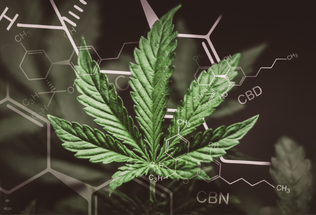Posted by Greg Collmann - Staff Writer on 23rd Jul 2023
Decoding Cannabinoids: An Overview of CBD, CBG, and CBN

Cannabinoids, the compounds found in cannabis, have gained significant attention due to their potential therapeutic properties. Among the myriad of cannabinoids, CBD (Cannabidiol), CBG (Cannabigerol), and CBN (Cannabinol) are worth understanding for their unique characteristics and effects. This article aims to provide an insightful overview of these three prominent cannabinoids.
Cannabidiol (CBD)
Cannabidiol, or CBD, is one of the most abundant and widely studied cannabinoids in cannabis. CBD is known for its potential therapeutic effects without producing the "high" associated with THC. Here's what we know about CBD:
- CBD is non-psychoactive, which makes it a popular choice for those seeking the health benefits of cannabinoids without the mind-altering effects.
- CBD has been researched for its potential to manage a variety of health issues such as chronic pain, epilepsy, and anxiety.
CBD is best used as a long term daily supplement. Most people see the most noticeable effects after at least 14 days of consistent use. Allowing CBD to “build up” within the body’s systems seems to be the best way to balance out the Endocannabinoid system
Despite the extensive research on CBD, it's crucial to remember that studies are still ongoing, and our understanding of CBD and its effects continues to evolve.
Cannabigerol (CBG)
Cannabigerol, or CBG, is often referred to as the "mother" or "stem cell" of cannabinoids, as it is the precursor from which other cannabinoids develop. Here's what we currently understand about CBG:
- CBG is typically present in low concentrations in most cannabis strains.
- Like CBD, CBG is non-psychoactive and does not produce the "high" associated with THC.
- While research on CBG is not as extensive as CBD, preliminary studies suggest potential health benefits, including anti-inflammatory and neuroprotective effects.
Our customers report that CBG is a great pain reliever and like CBD, it works best when taken consistently every day.
CBG's potential is still being explored, and it's expected that more research will shed light on its benefits and applications.
Cannabinol (CBN)
Cannabinol, or CBN, is a minor cannabinoid that is produced as THC ages and breaks down. This is what we know about CBN so far:
- CBN is present in small quantities in fresh cannabis but increases as the plant ages.
- CBN has a mild psychoactive effect, much less potent than THC.
- Early research suggests potential benefits such as sleep aid and anti-inflammatory properties.
CBN works for most people in a way that doesn’t cause a sedative effect like melatonin or other OTC or prescription sleep aids. CBN really shines at helping people get a more restful night's sleep. Coupled with the relaxing and calming properties of low dose THC, CBN can be an amazing way for many people to get the restful sleep the body needs.
As with CBD and CBG, research on CBN is ongoing, and a more comprehensive understanding of its effects is yet to be established.
Conclusion
CBD, CBG, and CBN each bring unique properties to the table, contributing to the wide range of potential benefits offered by cannabinoids. As research progresses, we can expect to learn more about these cannabinoids and how they can be utilized for health and wellness. Always remember, it's not about which cannabinoid is "better" than the other, but rather how they can synergistically work together for the benefit of the user.
These statements have not been evaluated by the Food and Drug Administration. This product is not intended to diagnose, treat, cure, or prevent any disease
